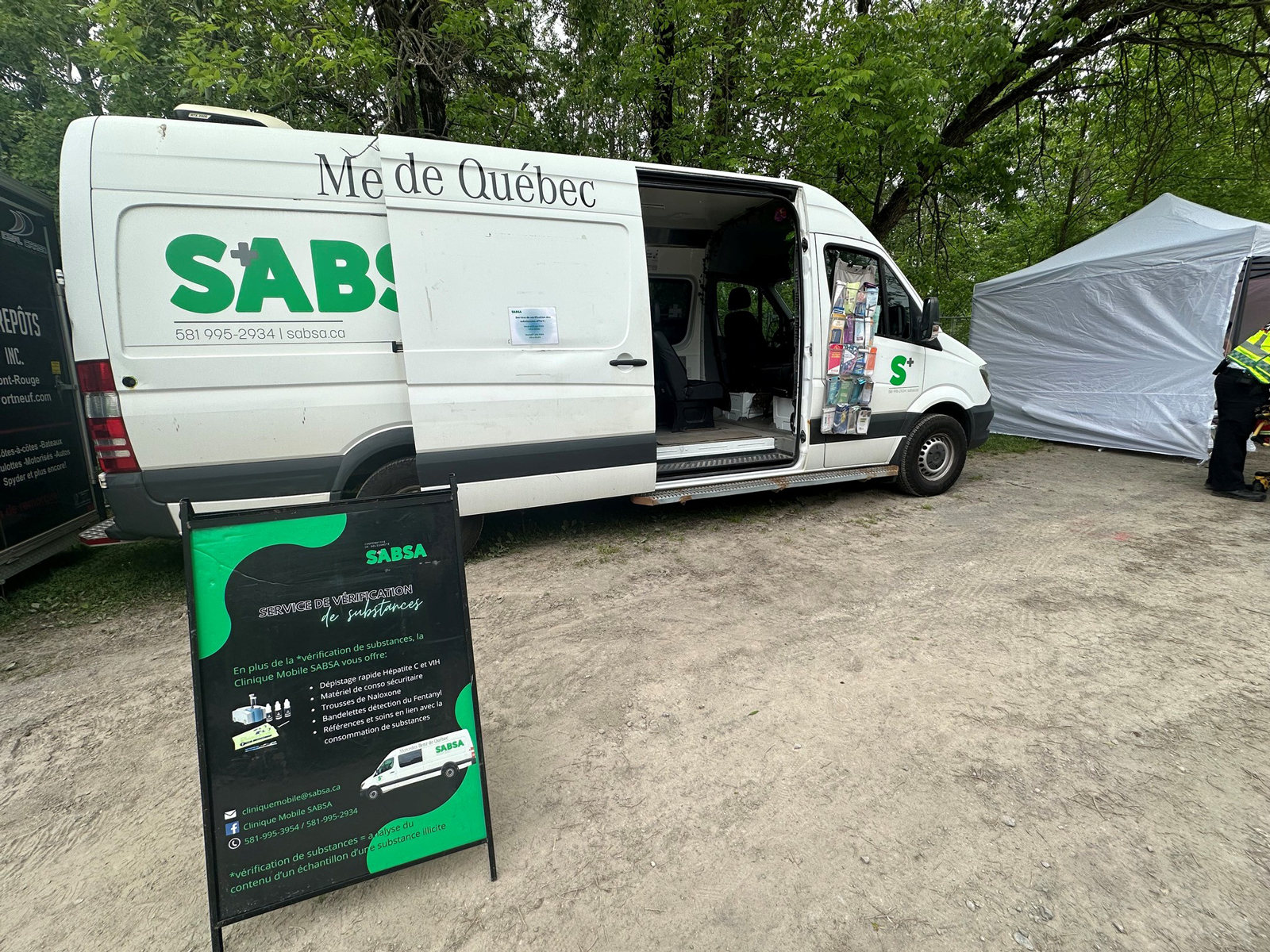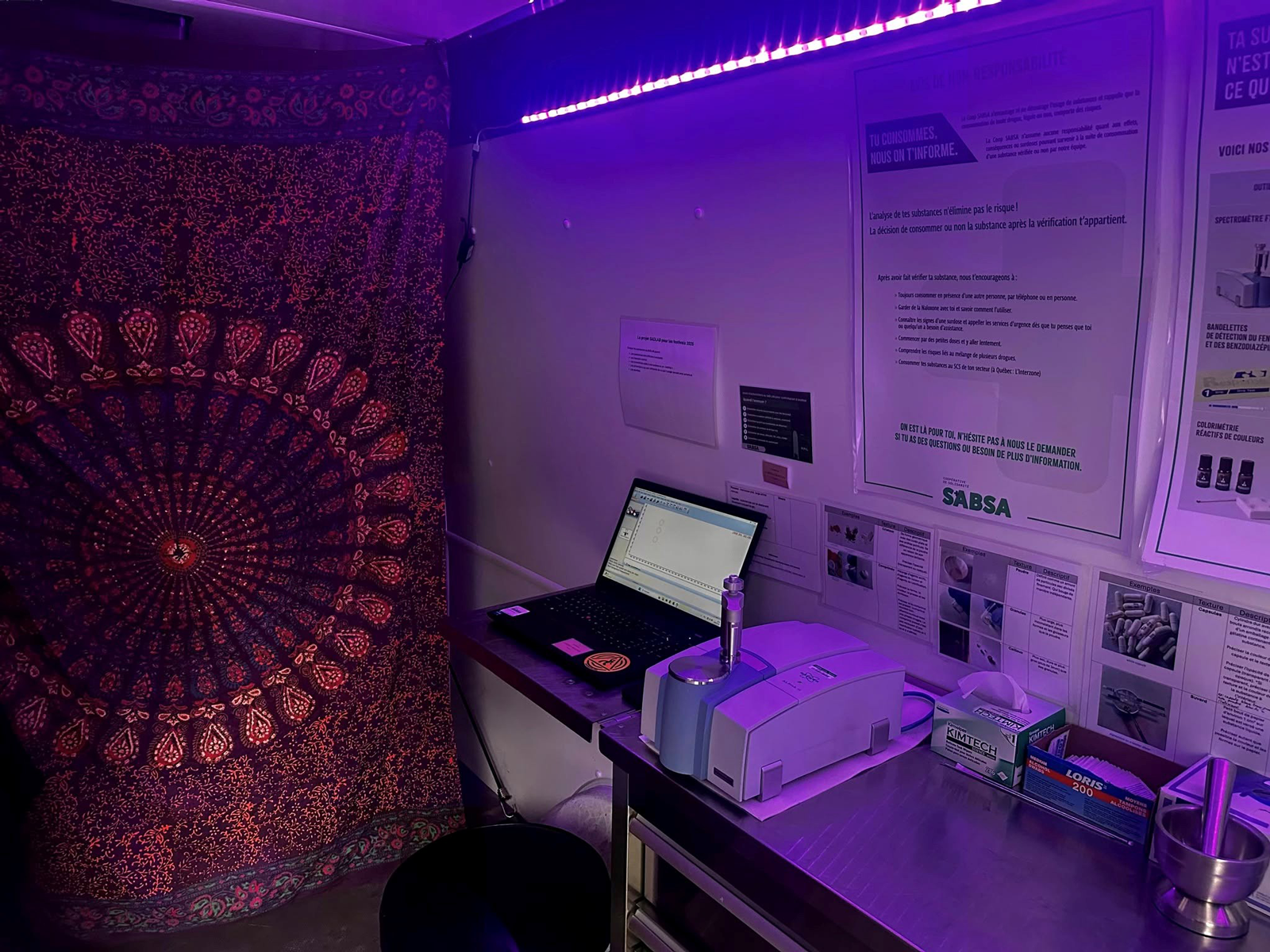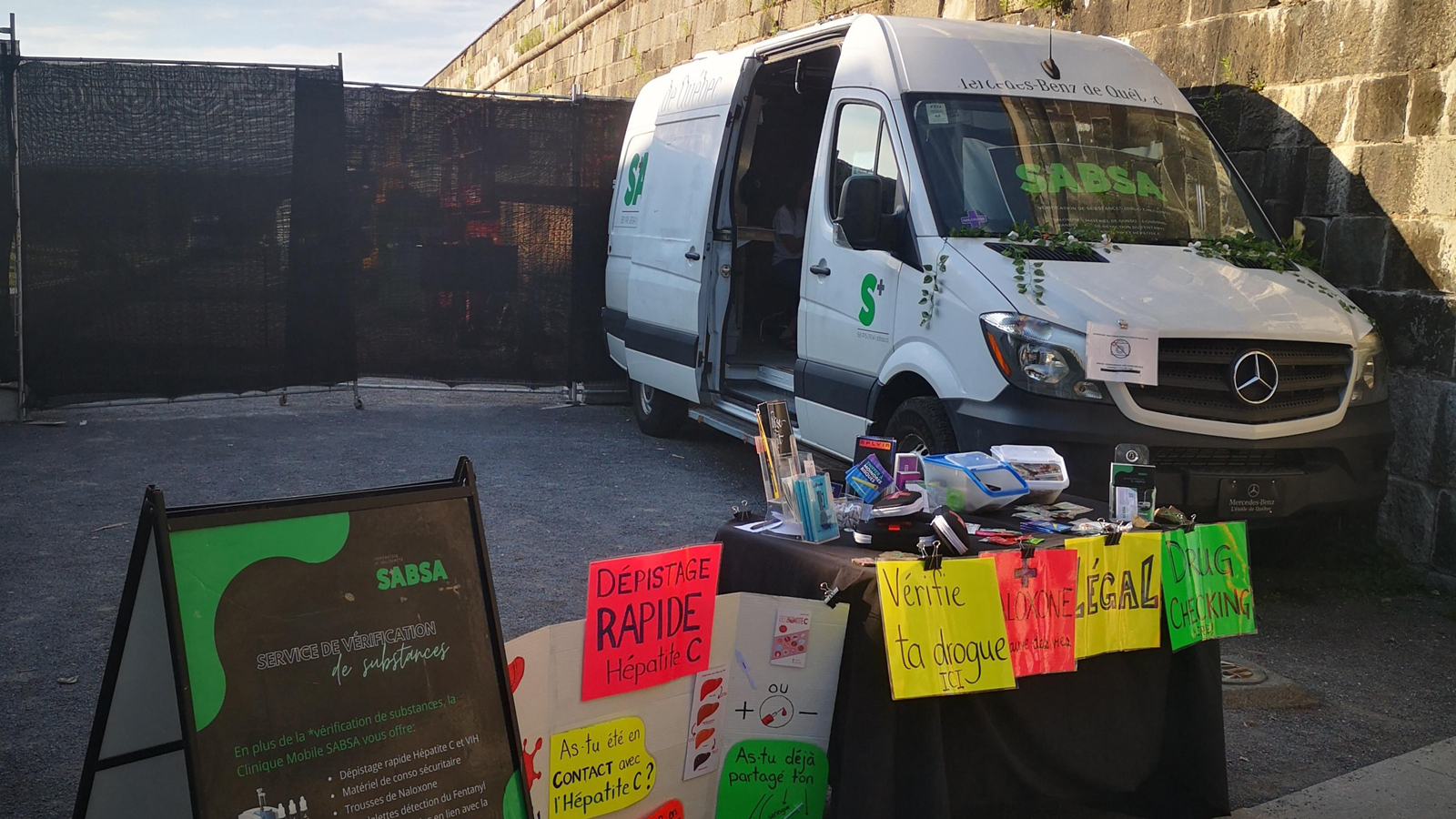What is the program?
The SABSA mobile clinic reaches marginalized people who face barriers to accessing the traditional healthcare system by bringing services to them where they are and when they need them. The mobile clinic operates in the Quebec City region and offers prevention, testing and treatment services for sexually transmitted and blood-borne infections (STBBIs), primary healthcare (e.g., wound care) and services related to drug use (e.g., naloxone distribution, drug checking, overdose prevention education).
The mobile clinic is operated by the Coopérative de solidarité SABSA (SABSA Solidarity Cooperative), which is a non-profit organization in Quebec City that serves marginalized communities, including people experiencing homelessness, street-involved people and people who use drugs. The mobile clinic is one of the three components of SABSA, which also includes a lower barrier fixed-site clinic with a multidisciplinary care team and a supervised consumption site called l’Interzone.
Why was the program developed?
The Coopérative de solidarité SABSA was founded in 2011 by a group of nurses who were seeing the rates of hepatitis C and HIV rise in their communities. They recognized that many marginalized people had little to no access to the related health and social services they needed. In response, they created a fixed-site clinic that brought together a multidisciplinary care team (e.g., nurse practitioners, psychosocial workers, social workers, a gastroenterologist, a physiotherapist, peer helpers) under one roof. The SABSA fixed-site clinic is located in the heart of the Saint-Roch neighbourhood and offers a full range of primary healthcare and social services, taking a broad, holistic approach to meet the needs of marginalized communities.
In 2019, the SABSA mobile clinic was launched to reach people who were not coming to the fixed-site clinic and to provide services directly in the community. The mobile clinic allows the team to meet people where they are, while also serving as a bridge to the fixed-site clinic for those who need more comprehensive care.
One of the goals of the mobile clinic is to address the high number of hepatitis C cases in the community. By providing hepatitis C testing, the team is able to diagnose infections and connect people to treatment. The mobile clinic makes it possible for SABSA to travel throughout the region, offering services beyond its fixed site, to help fulfil SABSA’s mission to serve the entire Quebec City region.
How does the program work?
The SABSA mobile clinic uses a specially equipped van to provide STBBI prevention, testing and treatment services, primary healthcare services, and services related to drug use (e.g., naloxone distribution) throughout the Quebec City region. It operates Monday to Friday on a variable schedule, serving a range of areas and offering a variety of services depending on the day of the week and the season.
The mobile clinic sets up in strategic locations, including across from a church, in parks that are popular with the target population, near community organizations or shelters, and in the parking lot of the SABSA fixed-site clinic. The team tries to return to the same places at the same times each week so that people know where and when to find them.
The mobile clinic staff can also provide services on demand at certain times in the week. People in need can call, text or use Facebook Messenger to ask for services at specific places (including in their homes) within Quebec City and the surrounding area. Staff can travel in the SABSA mobile clinic van or in other vehicles (e.g., nurse’s car), depending on the type of service required.
The mobile clinic team consists of three psychosocial workers, peer helpers (the number varies depending on availability) and a nurse. The peer helpers play a crucial role in building trust between the target populations and the SABSA team by liaising between them. They also help to promote the mobile clinic’s services through word of mouth.

Mobile clinic services
The mobile clinic provides three types of services:
- prevention, testing and treatment for hepatitis C, HIV and other STBBIs
- primary care and psychosocial support services (e.g., wound care)
- services related to drug use (e.g., drug checking services, naloxone distribution)
When a person comes to the mobile clinic, the team assesses their needs and informs them about the available services. The goal is to treat the whole person and to place their personal goals at the centre of each visit.
1. Prevention, testing and treatment for hepatitis C, HIV and other STBBIs
The mobile clinic takes a proactive and inclusive approach to the prevention, testing and treatment of STBBIs, including hepatitis C and HIV.
Prevention
Education is at the centre of the mobile clinic’s STBBI prevention work. Team members speak with the people who come to the mobile clinic and provide education while distributing new safer drug use equipment (e.g., syringes for injection and pipes for smoking), safer sex supplies (e.g., condoms) and educational pamphlets about sexual health and safer drug use.
Testing
The mobile clinic offers testing for hepatitis B and C, HIV, syphilis, chlamydia and gonorrhea. Hepatitis C rapid tests (OraQuick) and HIV self-testing kits are widely distributed; they are used as an engagement tool and can serve as an entry point to full STBBI testing. The aim is to make it easy for people to integrate testing into their routines.
If a person has a positive result on the HIV or hepatitis C rapid test, or if they decide to get tested for STBBIs more broadly, the nurse collects the required samples inside the mobile van (e.g., blood test).
If testing requires urine samples or anal swabs, the team seeks out private spaces near where the van is parked (e.g., the bathroom at a nearby community organization), as the mobile van does not have a private space for this.
At the end of the day, the nurse takes the samples to the SABSA fixed-site clinic. Samples are then taken by a specialized transporter to the Centre hospitalier de l’Université Laval (CHUL) in Quebec City for analysis. The results are typically ready in 48 to 72 hours for standard blood tests and seven to 10 days for a hepatitis C RNA reflex test, which is performed automatically on samples from individuals with a reactive hepatitis C antibody test.
Before testing is performed, the nurse or another staff member speaks with the person establish how to reach them about any positive STBBI test results. For example, it may be possible to leave word with a community organization where the person spends time, to contact them by telephone or to have the person come back to the mobile clinic at the place where the testing was done to get their results.
Treatment and linkage to care
The mobile clinic’s nurse can prescribe some treatments directly, such as for asymptomatic cases of chlamydia and gonorrhea, through medical directives in Quebec. For conditions requiring more complex care, such as syphilis, HIV or hepatitis C, the person is referred to the SABSA fixed-site clinic and is treated by a team including the clinic’s specialized nurse practitioners, infectious disease specialist and gastroenterologist. To maintain the therapeutic relationship, treatment follow-up is done either at the fixed-site clinic or by the mobile clinic’s nurse in the person’s home or in the community. The location of follow-up care depends on the person’s needs and stability.
2. Primary care and psychosocial support
Primary care
The mobile clinic’s approach to primary care is flexible and based on walk-in visits. The goal is to address people’s immediate health problems, particularly for those who are vulnerable or experiencing homelessness. These primary care services are provided by the mobile clinic’s nurse either in the van or in the person’s home.
When a person comes to the mobile clinic, the nurse completes an intake assessment to determine whether the person can be treated on site or if they need to be referred elsewhere. People who require more complex care (e.g., abscess drainage, gynecological exams, severe symptoms) are redirected to the SABSA fixed-site clinic or to specialists. If they are referred to the fixed-site clinic, a specialized nurse practitioner will assist in their care.
The types of care provided at the mobile clinic include wound and abscess care, and treatment for urinary tract infections, respiratory symptoms and skin infections. The nurse can also assess general physical and mental health symptoms and provide simple care, such as treating earaches and other minor conditions.
Psychosocial support
The psychosocial workers assess the broader needs of the people who come to the mobile clinic (e.g., housing, food, safety) and can direct them to appropriate resources (e.g., food banks and shelters). This work takes a harm reduction approach.
3. Services related to drug use
Drug checking
Launched in 2023, drug checking has been fully integrated into the mobile clinic’s services. This is the only drug checking service available in the Quebec City region.
The drug checking service uses a portable spectrometer, operated by a nurse or the psychosocial workers, to conduct rapid substance analysis in about five minutes. This service is provided on demand, meaning that people can ask for the van to come to their location. People can also visit the mobile clinic at its regular stops in certain places to have their substances checked.
Drug checking services provide an entry point to help build relationships with people in the community. Drug checking is often done in conjunction with a conversation about drug use habits and associated risks, and it is an opportunity to offer complementary services (e.g., STBBI testing, primary care or psychosocial support).

Prevention of overdoses and other harms related to drug use
The mobile clinic team distributes naloxone kits, fentanyl detection strips and new safer drug use supplies, such as syringes for injection and pipes for smoking (crack or meth). Education on safer drug use practices is also provided through conversations and pamphlets.
Opioid agonist therapy (OAT)
When a person receives services at the mobile clinic, the conversation can include substance use treatments such as OAT.
If a person is interested in OAT, the mobile clinic’s nurse carries out an OAT assessment. The nurse then brings that information to the fixed-site clinic, where the case is discussed by the multidisciplinary team. An official diagnosis of substance use disorder must be made by an addiction psychiatrist or another doctor (regularly present at the fixed-site clinic) to prescribe OAT.
The treatment can begin in 24 to 72 hours, often in coordination with a specialized nurse practitioner, and the OAT follow-up schedule is determined according to the person’s needs and abilities. Follow-up can be done at their home, at the mobile clinic or at the fixed-site clinic.
4. Other mobile clinic activities
Pop-up clinics
Every Thursday afternoon, the mobile clinic team visits community partner organizations in Quebec City and elsewhere in the region to provide STBBI testing services.
Festivals
In the summer, the mobile clinic sets up at festival sites throughout the region to provide select services to a broader population.
The focus is on overdose prevention, drug checking, and providing safer drug use equipment (e.g., syringes and pipes) and safer sex supplies (e.g., condoms). Hepatitis C rapid testing is also offered. If a person has a positive hepatitis C rapid test result, the SABSA team helps them access follow-up services as needed (e.g., hepatitis C RNA testing).
Required resources
- Manager or director in charge of program supervision
- Mobile clinic staff: two psychosocial workers, a nurse and peer helpers
- A specially equipped mobile van
- Link with a multidisciplinary fixed-site clinic to provide complementary services
- Supplies for providing nursing care
- Supplies for STBBI testing (e.g., swabs, blood draws)
- Hepatitis C rapid tests
- HIV self-tests
- Portable spectrometer for drug checking
- Harm reduction supplies: naloxone, fentanyl detection strips and new safer drug use supplies (e.g., syringes for injection and pipes for smoking)
- Safer sex supplies (e.g., condoms and lube)
- Educational resources on sexual health, STBBIs and harm reduction (e.g., pamphlets)
Evaluation
Mobile clinic services provided between January 1 and December 31, 2024:
- 49 people received a hepatitis C diagnosis
- 42 people started hepatitis C treatment
- there were 77 cases of ongoing hepatitis C follow-up
- 20% of people who received primary care services went on to receive STBBI testing
- 802 psychosocial support sessions were provided to 64 different people during consultations for STBBI testing or through the pop-up clinic
- 2,313 psychosocial support sessions were provided during consultations for services related to drug use
- 520 drug checks were performed
- 79 fentanyl test strips were distributed
- 170 syringes were distributed (116 for opioids, 54 for stimulants)
- 1,001 pipes (crack/meth) were distributed
Pop-up clinic services provided from September 2024 (when the services started) to December 2024:
- 14 pop-up clinics were held in 8 different organizations
- 94 different people received services
- 61 hepatitis C rapid tests were administered
- 36 full STBBI tests were carried out
- there were 17 nursing care sessions
- 2 people began hepatitis C treatment after receiving a diagnosis, and 2 people were referred to the SABSA fixed-site clinic for more comprehensive care
Festival services provided between January 1 and December 31, 2024:
- The mobile clinic was present at 6 major festivals in the Quebec City region
Challenges
- There has been some resistance from the community to the services offered by the mobile clinic, along with limited support from local businesses and residents.
- The right balance needs to be found between providing a mobile service and operating fixed spaces with fixed schedules: being visible and accessible without losing the flexibility of the mobile format.
- Budget constraints limit promotion of the mobile clinic’s services within the community (e.g., online advertising), and at festivals and outside Quebec City.
- Promoting the mobile clinic to people who do not have access to traditional communication methods is challenging.
- The mobile clinic is the only drug checking service in the Quebec City region and it has a limited capacity to meet the demand from all of the people who are interested in the service.
Lessons learned
- A regular presence in the community and the ability to provide lower barrier services efficiently are essential to creating relationships, initiating care and maintaining care.
- The approach must remain flexible, personalized and respectful of the person’s wants and needs.
Program materials
Annual reports for the Coopérative de solidarité SABSA (in French only)
Facebook page for the Coopérative de solidarité SABSA (in French only)
Facebook page for the Clinique Mobile SABSA (in French only)
SABSA: Quebec City’s one-stop shop for people who use drugs
Contact information
Marie-Christine Leclerc
Services Manager
Coopérative de solidarité SABSA
265A rue de la Couronne
Québec, QC G1K 6E1
418-914-9295 ext. 205
responsable.voletsdeservice@sabsa.ca
Marie-Odyle Massé
Nurse – overdose prevention, Clinique Mobile
Coopérative de solidarité SABSA
265A rue de la Couronne
Québec, QC G1K 6E1
581-995-3954
momasse@sabsa.ca

